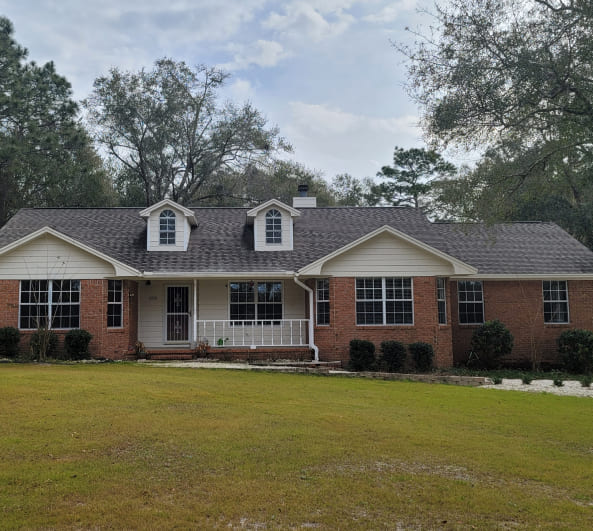Correct insulation is significant to keep comfortable indoor temperatures, lessen energy costs, and safeguard the structure of your home.
In this Florida roof insulation guide, we’ll delve into the importance of roofing insulation, exploring roof insulation benefits for Florida houses and why it’s crucial for homeowners in the Sunshine State to prioritize insulation in their roofing systems.
So if you reside in Crestview, Niceville, Milton, Pensacola and Pace, this is your ultimate guide to Florida home roof insulation!
How Important is Roof Insulation in Florida?
When embarking on a home construction project, the decision of insulation roof materials is significant in ensuring the best performance. In the hot and humid climate of Florida, where the roof and insulation are subjected to rigorous conditions, selecting the right materials becomes even more crucial.
Let’s explore the importance of roof insulation in Florida homes, focusing on key aspects such as energy efficiency, moisture control, comfort, and environmental impact.
Energy Efficiency
The correct insulation will assist in regulating temperatures by eliminating transfer of heat between the exterior and interior of the house. This results in less utilization of air conditioning in the hot Florida weather. This will then result in less consumption of energy and low utility bills.
Moisture Control
Florida has a humid climate. This makes houses prone to moisture buildup, which can result in the buildup of mold. Roof insulation acts as a barrier, preventing moisture from seeping into the home and causing these issues, thus preserving the integrity of the building materials.
Comfort
Efficient roof insulation plays a vital role in sustaining stable indoor temperatures, guaranteeing a cozy living space for occupants. By reducing heat influx in scorching summers and heat dissipation during colder spells, insulation fosters year-round comfort and enhances overall quality of life.
Environmental Impact
Minimizing energy usage via adequate roof insulation not only provides financial advantages for homeowners but also yields positive environmental outcomes. By diminishing the need for electricity, insulation aids in curbing greenhouse gas emissions linked to energy generation, thereby promoting a more eco-friendly future.
Benefits of Roof Insulation for Florida Homes
Lower Energy Bills
Effective roof insulation plays a crucial role in controlling indoor temperatures, mitigating the requirement for excessive air conditioning or heating. As a result, there is less energy usage and subsequently less utility expenses, leading to long-term savings for homeowners.
Better Indoor Air Quality
Roof insulation acts as a barrier against outdoor pollutants, allergens, and moisture infiltration, thus contributing to improved indoor air quality. By preventing the entry of pollutants, insulation helps create a healthier living environment for residents.
Extended Roof Lifespan
By lessening temperature fluctuations and thermal stress on roofing materials, correct insulation can extend the lifespan of the roof.
Noise Reduction
Insulation works to absorb and muffle external sounds, such as traffic or rainfall, creating a calmer and more serene indoor atmosphere.
This can improve overall comfort and enhance the enjoyment of living spaces, especially in urban or noisy areas. In summary, there are numerous roof insulation benefits that help your roof by lowering energy costs, improving indoor comfort, and enhancing the overall quality of life in your Florida home.
Florida Roof Insulation Requirements
Understanding the Florida roof insulation value underscores the critical importance of this aspect in residential construction. With the state’s unique climate considerations, recognizing how important roof insulation is becomes paramount for homeowners and builders alike. Let’s delve into the specific requirements and benefits of roof insulation in Florida homes to grasp its significance in maintaining energy efficiency, structural integrity, and overall comfort.
Building Codes
Florida’s building codes specify the minimum requirements for roof insulation in residential structures. Compliance with these insulation codes ensures that homes are adequately insulated to meet energy efficiency standards and withstand the state’s climate conditions.
Material Selection
Selecting the right insulation materials is crucial for meeting Florida home roof insulation requirements. Materials should have the appropriate R-value to effectively insulate the roof and meet energy efficiency standards. Additionally, materials should be resistant to moisture and mold growth to ensure long-term performance and durability.
Professional Installation
Correct roof insulation is key to ensure its longevity. Hiring a qualified and experienced contractor is recommended to ensure that insulation is installed correctly according to manufacturer specifications and building codes.
Moisture Control
Moisture control is a critical aspect of roof insulation in Florida, where high humidity levels can lead to mold and moisture-related issues. Insulation materials should have moisture-resistant properties, and proper ventilation systems should be in place to prevent condensation buildup and moisture infiltration.
In summary, meeting Florida’s roof insulation requirements involves adhering to building codes, selecting appropriate materials, ensuring professional installation, and implementing effective moisture control measures. By meeting these requirements, homeowners can ensure that their roofs are adequately insulated, energy-efficient, and resilient to Florida’s climate challenges.
Attic Insulation in Florida
Ensuring correct attic insulation in Florida is significant for keeping energy efficiency and comfort in homes. In light of Florida’s warm and humid climate, sufficient attic insulation is essential for moderating indoor temperatures, cutting down on energy expenses, and warding off moisture-related problems. Let’s explore the importance of attic insulation in Florida and how homeowners can benefit from investing in quality insulation solutions.
Kinds of Attic Insulation
Fiberglass Insulation: Fiberglass insulation comprises fine strands of glass fibers and stands as one of the prevailing choices for attic insulation. It comes in batts or rolls and is known for its affordability, fire resistance, and effectiveness at reducing heat transfer.
Cellulose Insulation: Crafted from reclaimed paper or plant fibers treated with fire-retardant compounds, cellulose insulation boasts eco-friendly credentials and delivers superb thermal efficiency. It is blown or sprayed into attic spaces and provides effective resistance against heat flow.
Spray Foam Insulation: Spray foam insulation presents a versatile solution that expands upon application, effectively sealing gaps and crevices to form an airtight barrier.
Radiant Barrier Insulation: Radiant barrier insulation deflects radiant heat away from the attic, aiding in maintaining a cooler environment within the space.It is typically installed under the roof rafters or on attic floors and can significantly reduce cooling costs in hot climates like Florida.
Reflective Insulation: Reflective insulation is composed of insulation material sandwiched between layers of reflective material, like aluminum foil, designed to enhance heat reflection. It works by reflecting heat away from the attic, making it an effective option for reducing heat gain in sunny climates.
Conclusion
In conclusion, the Florida Roof Insulation Guide highlights the paramount importance of proper roof insulation in the Sunshine State. Understanding why roof insulation is important is essential for homeowners to ensure energy efficiency, moisture control, and structural integrity in their homes.
By adhering to Florida’s roof insulation requirements, selecting appropriate materials, and prioritizing professional installation, homeowners can reap the benefits of lower energy bills, improved indoor air quality, and extended roof lifespan. Investing in quality roof insulation not only enhances the comfort and safety of Florida homes but also contributes to a more sustainable and resilient built environment for future generations.
FAQs
- What steps can homeowners take to ensure their roof insulation remains effective over time in Florida’s climate?
To ensure their roof insulation remains effective over time in Florida’s climate, homeowners should regularly inspect their attic insulation for signs of damage, such as moisture infiltration or compression. Additionally, sealing any air leaks and maintaining proper ventilation can help prevent moisture buildup and mold growth. - Are there any governmental incentives or rebates offered for installing roof insulation in Florida?
Incentives and rebates are present for the installation of roof insulation in Florida. Some programs include Federal Residential Renewable Energy Tax Credit or utility company rebates focusing on energy-efficient developments. Homeowners can discuss with local utility providers and government agencies to ascertain current incentive programs and the eligibility criteria. - Are there any specific considerations for retrofitting existing roofs with insulation in Florida?
For retrofitting existing roofs with insulation, homeowners should assess the condition of their existing roof and attic space to determine the most suitable insulation options. Additionally, addressing any air leaks or ventilation issues before installing insulation is essential to prevent moisture problems. It’s also important to consult with a qualified contractor familiar with retrofitting techniques and building codes in Florida to ensure proper installation and compliance with regulations.






